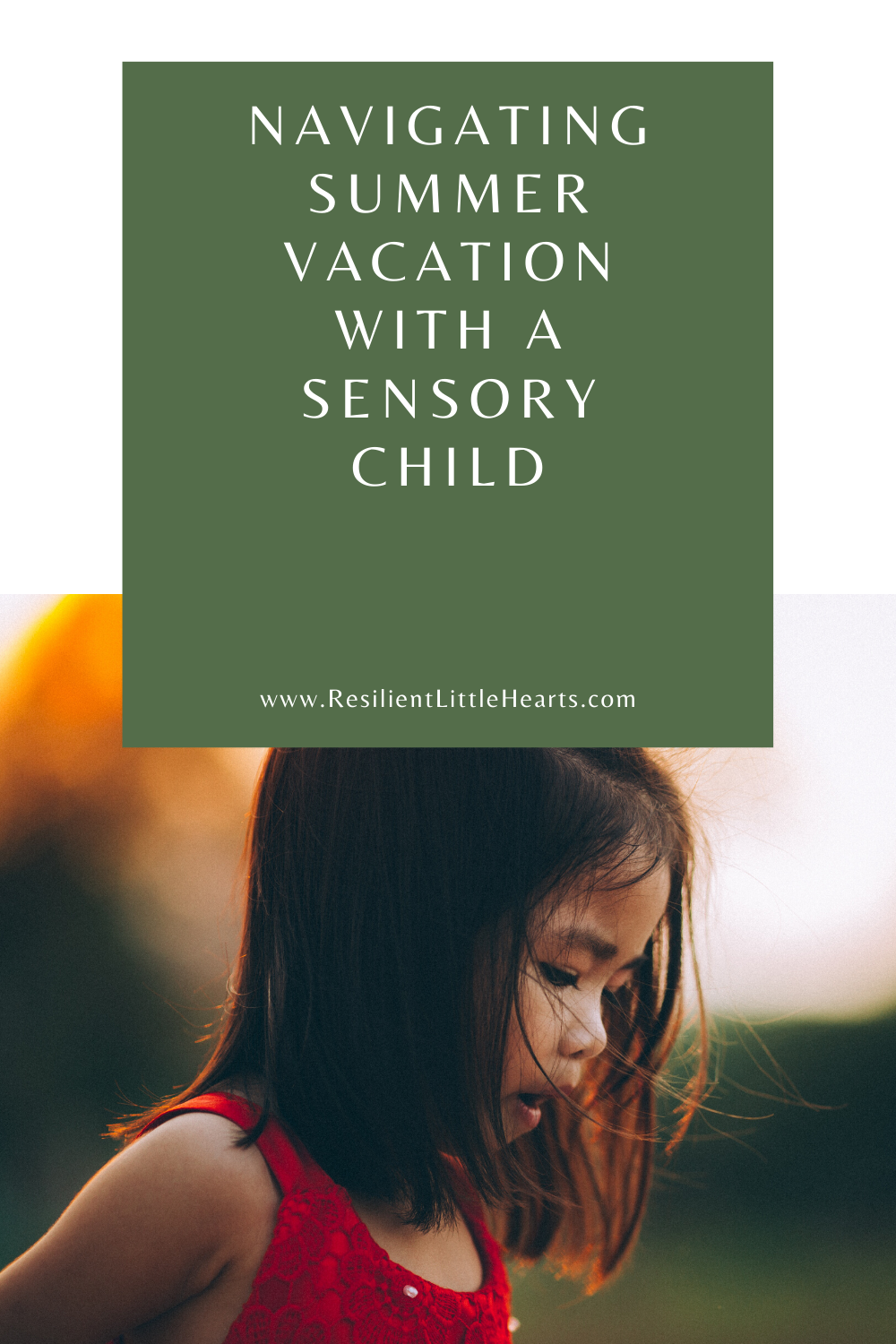5 Proven Ways To Build Resilience In Your Child
Navigating Summer Vacation With A Sensory Child
Summer is here! School is finished, temperatures are rising & we are now navigating summer vacation with our plans probably looking different than we expected.
Extended time with children at home all summer can be challenging for every family, but this is particularly true if you a raising a child with sensory differences, needs or challenges.
This may apply to children with:
- Attention deficit hyperactivity disorder (ADHD)
- Sensory Processing Disorder (SPD)
- Asperger syndrome (AS)
- Autism
- Highly Sensitive Personality (HSP)
If you are raising (or think you may be raising) a child with sensory challenges or needs, you will find that you need to navigate summer vacation differently than other families.
SENSORY DIFFERENCES IN CHILDREN
A child with sensory differences means that the information that comes into their brain through their senses (touch, sight, hearing, smell & taste), is either significantly overwhelming or underwhelming for them.
A child that finds sensory input overwhelming is considered “sensory avoidant”. These children become easily overwhelmed by sensory input & when they reach a point of overwhelm it usually ends in emotional meltdowns or aggressive behavior.
A child that finds sensory input underwhelming is considered “sensory seeking”. These children constantly seek out more sensory input & will also reach a point of hyperactivity, emotional meltdowns or aggressive behavior.
Some of the challenges that children with sensory differences struggle with are changes in daily routines (especially “sensory avoidant”).
Change or overstimulation causes an activation in their internal stress response. They will “fight, flight or freeze” & will meet the change or overstimulation with either stubborn resistance or emotional meltdown (which usually results in huge moments of tension over basic activities in family life).
As you can imagine, summer vacation is particularly challenging for children with sensory differences. There is a loss of structure & routine, & an overwhelming increase of sensory input from temperatures, to exciting activities, to swimming or the beach etc.
While many families look forward to the relaxed time that summer vacation will bring, usually the very thought of navigating summer vacation with children with sensory differences will bring anxiety.
We cannot approach summer vacation with sensory children, the same way we would if our children didn’t have these differences. There are particular approaches & plans that will help you navigate summer vacation with your sensory child.
A NOTE TO PARENTS
The tips below are general advice to help children with sensory differences. Every child is unique & different, so take what works for your family & ignore the rest.
NAVIGATING SUMMER VACATION WITH A SENSORY CHILD
Even if you implement all of the following steps listed below, you are still going to have some extremely challenging moments or days. Your child will still struggle with emotional meltdowns or aggressive behavior. As a parent, this is particularly draining to deal with on a daily basis.
The best gift you can give your child is to not be “on the edge” yourself. When you have some personal emotional bandwidth, you will notice that you have more capacity to respond rather than react to their behavior. Therefore it’s important you plan space & rest for yourself also, maybe asking another family member or friend to step in with your child for some of the time.
If you don’t have realistic expectations about what is going to work during summer vacation with your sensory child, you are going to add additional frustration & stress.
The truth is that you can’t do everything other families are doing, & it probably isn’t going to be a very relaxing time for you as a parent. These can be a really hard truth to face & can sometimes cause us to feel emotions associated with grief.
But the more you can accept your child for who they are (with all their strengths & limitations), the easier you will find it to work together.
Although a schedule or routine seems to be the antithesis of summer vacation, your sensory child will LOVE it.
Children with sensory differences hate change. They thrive within the rhythms & routines of a school year. This is because they know exactly what to expect & things feel predictable.
When we have summer vacation, as a family we want to relax. This means usually everything is unpredictable – people get up in the morning when they want; if everyone feels like doing something you might go out to an activity.
As much as you may be craving this in your family right now, the chances are high that this won’t work if you have a child is sensory differences. Without the structure & routine, they will likely fight you on all the daily small transitions (such as getting dressed, or leaving the house) so much that you will wish you hadn’t asked them to do it at all.
The best way to deal with this is to create a structure to your days & weeks that you continue to follow even in summer vacation.
Have a predictable bedtime, nighttime & morning routine.
If you want to go out a lot to activities, it will help if the time of the day you go out is predictable. For example – every morning you go out to an activity outside the home, every afternoon is spent at home.
Then you need to communicate these routines to your child through a visual schedule. This is so they are clear of what is happening next.
We have created free templates of daily & weekly visual routine charts, that you can download once & use over again to create simply visual routines for your sensory child.
Click here for visual routine charts.
Despite all your best efforts, sensory children will still become overwhelmed regularly. This is why it’s important that you are intentionally aware of what helps your child return to a state of calm.
This is different for each child, so try out some different ideas & see what works best.
Some ideas are:
- weighted blankets
- coloring quietly
- playing with legos
- fidget spinners or cubes
- listening to audiobooks (we have some of our favorites audiobooks linked in our blog Screen-free activities for children, click here)
You will know that it is a calming activity for your child, if after about 15-20mins they seemed to have returned to themselves.
It can be tempting during summer vacation to just allow your child to have access to media without any boundaries (also because we need a break!).
The problem is any type of screen is highly stimulating & addictive for sensory children – this is particularly true for video games.
Just like you would set limits on technology during the school year, place boundaries on media during summer vacation. These boundaries may include more screen time than usual (if your child can handle it with their sensory challenges), but unrestricted access will cause major behavioral problems at the end of the day.
So many parents feel guilt about media – whether their children watch too much of it, or if they are being too strict. This is not a moral issue, & everyone has days where you need your child to have a lot of screen time for you to survive. This is just about being aware & mindful about how this time is affecting your sensory child, & therefore your whole family.
Children with sensory differences need a significant amount of quiet space to decompress.
Research has shown that children with sensory differences & the highly sensitive personality are actually taking in more stimulation from situations, than those who don’t have these differences.
This means they are not “over-reacting” to a situation. They are normally reacting to an over-amount of stimulation.
During summer vacation, increase the white space for your child.
One practice is adopting “quiet time” everyday (at the same time!). This is a time of day where everyone has quiet play or listen to audio books in their bedroom (or separate spaces if your children share rooms). This time can last between 1-2 hours depending on the age of your children.
Another practice is scheduling “home days” after a particularly exciting or busy few days of activities. This is where your child is free to play at home as they’d like.
There is only so far you can “push” your sensory child into engaging in activities & stimulation (& you know this point for your own child), before their inability to cope will result in meltdowns & aggression.
Think of ‘white space’ as re-filling your child’s emotional cup & ability to cope. After enough time of decompression & rest, they will have capacity to cope with the stressful demands of stimulation again.
Children need physical activity & fresh air for their healthy development. Particularly for “sensory-seeking” children, movement & the outside stimulation helps regulate their internal world.
Sometimes “sensory avoidant” children can become so resistant to stimulation that they want to stay indoors all the time to “avoid” the movement & outside world.
It’s important that we regularly require them to go outside & play (even 15-30mins makes a big difference). Even though it’s challenging, if we consistently allow them to stay inside & not move around, they will become even more resistant to these healthy activities over time.
You can do this in the early mornings or late afternoons (to avoid the high temperatures). You could go on a walk together. You could create a deal that if they must play outside for a certain time before they can have their media time.
It is a lot easier to empathize with your sensory child, if you also have strong sensory preferences or differences. It is a lot more challenging when this is not your personal experience.
Some meltdowns can be avoided by really understanding what your child is complaining about.
For example, they may say that they hate swimming & don’t want to go with the family.
Ask them, “what is it particularly about swimming you don’t like?”
Is it the feeling of water? Putting their head under water? Their eyes hurting from the water? The feeling of their swimmers on their body?
Sometimes making some small adjustments (like finding more comfortable swimmers, some swimming goggles, or suggesting they can swim in the shallow end of the pool & no one will put their head underwater), can make a big difference in their resistance to participate in the activity.
Raising a child with sensory differences can be incredibly challenging. It often requires five times the patience & you can find yourself at the end of the day beating yourself up that you didn’t manage it better.
Your child is blessed that they have a parent who care’s enough to understand them & to do their best to support them.
Find a friend who understands what you’re going through & support one another. Raising children with additional needs can be extremely lonely at times, especially if the friendships you are surrounded by don’t have the same challenges with their children.
Even though navigating summer vacation with a sensory child can be very challenging at times, it is still possible to have a meaningful & connected time with your family.












